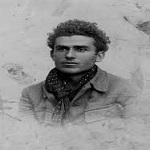 1913– Petro Marko was born in Dhërmi, teacher, publicist, journalist, member of the Communist Group of Tirana, interbrigadist and Albanian writer. The President of Albania, Alfred Moisiu, in 2003 decorated Petro Marko with the Order “Honor of the Nation”. In 1934 he was part of the Communist Group of Tirana, attending its meetings without knowing who the chairman was. He is in constant contact with the leftist press, through the Greek newspapers, which were given to him by Asim Vokshi. From the confusion he had, the pretext was found that Petrua was giving communist literature to the students (false accusation). He was forced to leave for the first time in Greece. He stays in Corfu, where he comes in contact with the political emigrants there, headed by dr. Omer Nishanin. He considers the possibility of going to the Soviet Union, where Sejfulla Maleshova, Ali Kelmendi and Tajar Zavalani were at the time, but falls short as an opportunity. Participates in the Meeting of Anti-Fascist Writers in Valencia, which was also attended by Ernest Hemingway, Pablo Neruda, etc. At the end of 1944, he was in Shkodra at the house of Nush Topalli, when he was being raided by Yugoslav troops. He is invited to stay at the head of the newspaper “Bashkimi” in Tirana from 1945-1947, from a surprise check they find articles outside the party line, writes that Hysni Kapo escaped the shooting and was released on May 15, 1950. In 1957 teachers in the technical school “November 8”. 1973 is revoked for publication. In 1975 his son, Jamarbër, was imprisoned. The novel “Çuka e shtegtarit” – 1980 as a directive for self-criticism by the Party; but they did not accept it and it was not published. This is for the sole reason that he could not agree from the first days of power with the beginning of the dictatorship, especially when he tried to resist the dictatorship that was coming to Albania at that time from abroad, mainly from Belgrade. After the fall of the dictatorship, together with Sabri Godon and Vangjush Gambeten, he founded the Republican Party of Albania.
1913– Petro Marko was born in Dhërmi, teacher, publicist, journalist, member of the Communist Group of Tirana, interbrigadist and Albanian writer. The President of Albania, Alfred Moisiu, in 2003 decorated Petro Marko with the Order “Honor of the Nation”. In 1934 he was part of the Communist Group of Tirana, attending its meetings without knowing who the chairman was. He is in constant contact with the leftist press, through the Greek newspapers, which were given to him by Asim Vokshi. From the confusion he had, the pretext was found that Petrua was giving communist literature to the students (false accusation). He was forced to leave for the first time in Greece. He stays in Corfu, where he comes in contact with the political emigrants there, headed by dr. Omer Nishanin. He considers the possibility of going to the Soviet Union, where Sejfulla Maleshova, Ali Kelmendi and Tajar Zavalani were at the time, but falls short as an opportunity. Participates in the Meeting of Anti-Fascist Writers in Valencia, which was also attended by Ernest Hemingway, Pablo Neruda, etc. At the end of 1944, he was in Shkodra at the house of Nush Topalli, when he was being raided by Yugoslav troops. He is invited to stay at the head of the newspaper “Bashkimi” in Tirana from 1945-1947, from a surprise check they find articles outside the party line, writes that Hysni Kapo escaped the shooting and was released on May 15, 1950. In 1957 teachers in the technical school “November 8”. 1973 is revoked for publication. In 1975 his son, Jamarbër, was imprisoned. The novel “Çuka e shtegtarit” – 1980 as a directive for self-criticism by the Party; but they did not accept it and it was not published. This is for the sole reason that he could not agree from the first days of power with the beginning of the dictatorship, especially when he tried to resist the dictatorship that was coming to Albania at that time from abroad, mainly from Belgrade. After the fall of the dictatorship, together with Sabri Godon and Vangjush Gambeten, he founded the Republican Party of Albania.
 1915 – Albert Einstein presents field equations of general relativity at the Prussian Academy of Sciences. General relativity is a theory of gravity developed by Albert Einstein between 1907 and 1915. According to general relativity, the effect of the observed observation between masses results from their decay of space. This process was otherwise known as the “Einstein Equation”. Albert Einstein, would win the Nobel Prize in Physics in 1921 precisely for the Theory of Relativity.
1915 – Albert Einstein presents field equations of general relativity at the Prussian Academy of Sciences. General relativity is a theory of gravity developed by Albert Einstein between 1907 and 1915. According to general relativity, the effect of the observed observation between masses results from their decay of space. This process was otherwise known as the “Einstein Equation”. Albert Einstein, would win the Nobel Prize in Physics in 1921 precisely for the Theory of Relativity.
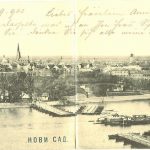 1918 – Vojvodina formally, the land of the Austro-Hungarian crown, announces its secession from Austria-Hungary to join the Kingdom of Serbia. On November 25, 1918, the Assembly of Serbs, Bunjevci and other Vojvodina nations in Novi Sad declared the unification of Vojvodina (Banat, Bačka and Baranja) with the Kingdom of Serbia (the Assembly had 757 deputies, of whom 578 were Serbs, 84 Bunjevci, 62 Slovaks, 21 Russians, 6 Germans, 3 Scots, 2 Croats and 1 Hungarian).
1918 – Vojvodina formally, the land of the Austro-Hungarian crown, announces its secession from Austria-Hungary to join the Kingdom of Serbia. On November 25, 1918, the Assembly of Serbs, Bunjevci and other Vojvodina nations in Novi Sad declared the unification of Vojvodina (Banat, Bačka and Baranja) with the Kingdom of Serbia (the Assembly had 757 deputies, of whom 578 were Serbs, 84 Bunjevci, 62 Slovaks, 21 Russians, 6 Germans, 3 Scots, 2 Croats and 1 Hungarian).
 1945– Ibrahim Madhi was born in Tirana, one of the most important figures of Albanian music and interpretation art. Known for his magnificent formation and musicality, the eminent musician has made a valuable contribution to the formation of the national school of musical interpretation. For his special merits and contribution, he enjoyed the highest title of art in Albania: “People’s Artist”. His name is associated not only with being a brilliant soloist, but at the same time a perfect conductor of chamber music groups and string orchestra. The applause for the Albanian school of violin interpretation cannot be understood without the name of Ibrahim Madhi as one of the central figures of this school. The beginnings of his pedagogical activity belong to 1962, previously as a violin class teacher at the Artistic High School “J. Misja” and then, in 1965, near I.L.Arteve. For more than 40 years of pedagogical career, he has trained entire generations of prominent violinists and musicians.
1945– Ibrahim Madhi was born in Tirana, one of the most important figures of Albanian music and interpretation art. Known for his magnificent formation and musicality, the eminent musician has made a valuable contribution to the formation of the national school of musical interpretation. For his special merits and contribution, he enjoyed the highest title of art in Albania: “People’s Artist”. His name is associated not only with being a brilliant soloist, but at the same time a perfect conductor of chamber music groups and string orchestra. The applause for the Albanian school of violin interpretation cannot be understood without the name of Ibrahim Madhi as one of the central figures of this school. The beginnings of his pedagogical activity belong to 1962, previously as a violin class teacher at the Artistic High School “J. Misja” and then, in 1965, near I.L.Arteve. For more than 40 years of pedagogical career, he has trained entire generations of prominent violinists and musicians.
 1950 – In the United States, the Great Appalachian Storm of November strikes 22 US states, killing 353 people, injuring more than 160, and causing $ 66.7 million in damage. The Great Appalachian Storm of November 1950 was a large extratropic cyclone that moved across the Eastern United States, causing considerable winds, heavy rains in the east of the Appalachians, and glare conditions along the western slopes of the mountain range.
1950 – In the United States, the Great Appalachian Storm of November strikes 22 US states, killing 353 people, injuring more than 160, and causing $ 66.7 million in damage. The Great Appalachian Storm of November 1950 was a large extratropic cyclone that moved across the Eastern United States, causing considerable winds, heavy rains in the east of the Appalachians, and glare conditions along the western slopes of the mountain range.
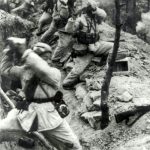 1952 – During the Korean War, after 42 days of fighting, the Battle of the Hill Triangle ends with the victory of Chinese troops. US and South Korean military units abandon their attempt to capture the “Iron Triangle”. The losses in the ranks of the Chinese were about 5 thousand troops while, on the side of the Americans and South Koreans about 2 thousand. Members of the United Nations multinational force were also involved in the fighting.
1952 – During the Korean War, after 42 days of fighting, the Battle of the Hill Triangle ends with the victory of Chinese troops. US and South Korean military units abandon their attempt to capture the “Iron Triangle”. The losses in the ranks of the Chinese were about 5 thousand troops while, on the side of the Americans and South Koreans about 2 thousand. Members of the United Nations multinational force were also involved in the fighting.
 1960 – Born in Washington John F. Kennedy Jr. Kennedy junior, was a lawyer, journalist and publisher of the American magazine. He was the son of President John F. Kennedy and First Lady Jacqueline Kennedy and the younger brother of Caroline Kennedy. His father was killed three days before his third birthday. Trained as a lawyer, he has worked as an assistant attorney for the New York district for nearly four years. In 1995, he started George magazine, using his famous political status. He died in a plane crash in 1999 at the age of 38.
1960 – Born in Washington John F. Kennedy Jr. Kennedy junior, was a lawyer, journalist and publisher of the American magazine. He was the son of President John F. Kennedy and First Lady Jacqueline Kennedy and the younger brother of Caroline Kennedy. His father was killed three days before his third birthday. Trained as a lawyer, he has worked as an assistant attorney for the New York district for nearly four years. In 1995, he started George magazine, using his famous political status. He died in a plane crash in 1999 at the age of 38.
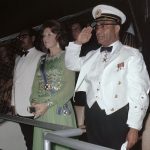 1975 – Suriname declares independence from the Kingdom of the Netherlands. Its capital was chosen Paramaribo. The country’s first president was Johan Ferrier, the former governor, with Henck Arron (then leader of the NPS) as Prime Minister. In the years leading up to independence, nearly a third of the population of Suriname emigrated to the Netherlands, amid concerns that the new country would be punished worse under independence than it had as an integral part of the Kingdom of the Netherlands.
1975 – Suriname declares independence from the Kingdom of the Netherlands. Its capital was chosen Paramaribo. The country’s first president was Johan Ferrier, the former governor, with Henck Arron (then leader of the NPS) as Prime Minister. In the years leading up to independence, nearly a third of the population of Suriname emigrated to the Netherlands, amid concerns that the new country would be punished worse under independence than it had as an integral part of the Kingdom of the Netherlands.
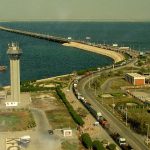 1986 – King Fahd’s long promenade is inaugurated in the Persian Gulf. “King Fahd” is a series of bridges and roads that connect Saudi Arabia and Bahrain. The idea for the road construction was based on improving ties and connections between Saudi Arabia and Bahrain. Sea surveillance began in 1968, and construction began in 1981 and continued until 1986, when it was officially opened to the public. This promenade is 25 km long and the cost for its construction cost 800 million dollars.
1986 – King Fahd’s long promenade is inaugurated in the Persian Gulf. “King Fahd” is a series of bridges and roads that connect Saudi Arabia and Bahrain. The idea for the road construction was based on improving ties and connections between Saudi Arabia and Bahrain. Sea surveillance began in 1968, and construction began in 1981 and continued until 1986, when it was officially opened to the public. This promenade is 25 km long and the cost for its construction cost 800 million dollars.
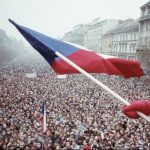 1992 – The Czechoslovak Federal Assembly votes to divide the country into the Czech Republic and Slovakia, effective January 1, 1993. The two countries go through economic reforms and privatizations in order to create a market economy. This process was largely successful. Prague was chosen as the capital of the Czech Republic, and Bratislava as the capital of Slovakia. Today both countries are members of the EU and NATO. The Czech Republic and Slovakia, in terms of market economy, are today two of the most developed countries in Central Europe.
1992 – The Czechoslovak Federal Assembly votes to divide the country into the Czech Republic and Slovakia, effective January 1, 1993. The two countries go through economic reforms and privatizations in order to create a market economy. This process was largely successful. Prague was chosen as the capital of the Czech Republic, and Bratislava as the capital of Slovakia. Today both countries are members of the EU and NATO. The Czech Republic and Slovakia, in terms of market economy, are today two of the most developed countries in Central Europe.
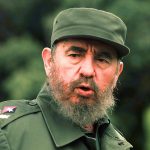 2016 – Fidel Castro dies at the age of 90 in Havana. Castro was a Cuban communist revolutionary and politician who led the Republic of Cuba as Prime Minister from 1959 to 1976 and then as President from 1976 to 2008. Fidel Castro also served as First Secretary of the Communist Party of Cuba from 1961 to in 2011. Under his administration, Cuba became a one-party communist state, while industry and business were nationalized and socialist state policies were implemented throughout society.
2016 – Fidel Castro dies at the age of 90 in Havana. Castro was a Cuban communist revolutionary and politician who led the Republic of Cuba as Prime Minister from 1959 to 1976 and then as President from 1976 to 2008. Fidel Castro also served as First Secretary of the Communist Party of Cuba from 1961 to in 2011. Under his administration, Cuba became a one-party communist state, while industry and business were nationalized and socialist state policies were implemented throughout society.








